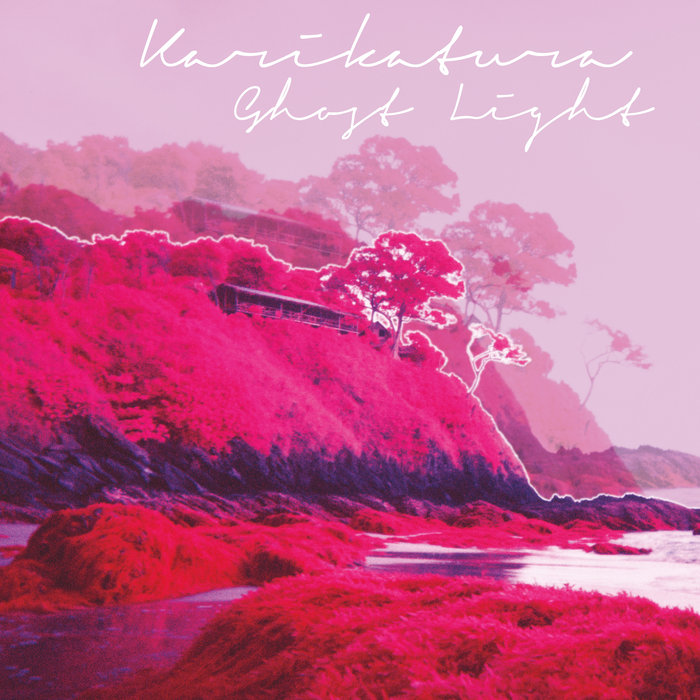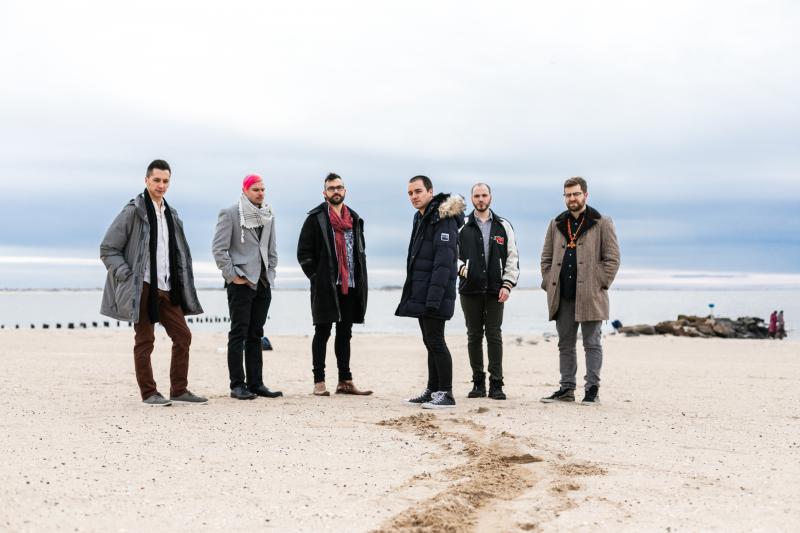Interview: Karikatura Defines Itself with 'Ghost Light'
Names for styles of music are a dime a dozen, but for sound, the New York-based Karikatura has genuinely pioneered their own, a caricature in its own right. "It's the same word in a lot of different languages," drummer Morgan Greenstreet explains, "that's why (guitarist/founder) Dima Kay chose that. Mostly in Eastern Europe and also Turkey, it's spelled that way. Dima is from Ukraine, and it's the same word, but a lot of people think because some of the music we play also has some influences from Latin America and the Caribbean, and it's the same word in Spanish and spelled differently. Over the years we've come to kind of feel it's just a word, a name we attach to our music."
Karikatura's sound is called Global Soul, but whatever it's called doesn't matter to Greenstreet or the band. "Genres are very malleable," he says, "it's always been something we've struggled with is how to define the music we make. It's not necessary to define it that way. Somebody can listen to it and enjoy it, and that's enough."
Greenstreet speaks with enthusiasm and joy, often laughing as we talk. The latest recording, Ghost Light does take a slightly more serious tone, however.
"We worked on this album for about two years," he says, "so it was very intentional, and we took our time with it. It is a darker, more melancholy album in total. We wrote a lot of material and then really thought about what would make sense as a complete picture for this album. We wanted it to tell a story."
The saxophone of Noah Dreiblatt and wind instruments open "Papercut," the kickoff track, then into an R&B influenced vocal from Ryan Acquoaotta. "Ryan's vocal style I think is very informed by African-American vocal techniques," Greenstreet assesses, "and also musical theater, and pop. Pop is such a broad genre, but I think more than ever, this is a pop record. There's a clear chorus, a clear message, there are hooks, that to me is pop music, and I'm very comfortable with that term."
Ghost Light moves into the cleverly-written "I'll Make Room," and the sound weaves its way through the single "La Pluie," written by Greenstreet. "There was an aesthetic that we were going for," Greenstreet explains, "and the way that we were able to realize that aesthetic a lot more was that we were able to record at Dima's studio, so we could spend all night there just experimenting on a particular song. So, there was a lot more hands-on production for this record."
The band sings in five different languages, and "La Pluie" was written that way. "It was raining and the rain samples on the track," Greenstreet says. "I just stuck my recorder out the window and sampled that up and started working on that. It came together in one night; the song is about reconciliation; there are a lot of songs on this album, about the distance that forms between partners between lovers and domestic partners, when everybody's hustling so hard, everybody's chasing their dreams, and it feels like you're living with a stranger.
"(The song) was about a feeling I've had to try to get past that, trying to reach out to somebody and break through the barriers. I feel like that's a feeling I've felt in relationships, I think that we all can relate to. it follows strangers again on the album, and that's a direct response."
All members of Karikatura have a hand in the band's progress. "We encourage, in fact, we push every member of the band to write songs," Greenstreet points out, "but then we edit and add onto each other's songs, and have sessions of one or two people to work on the lyrics or to work on some aspect of the song. Ryan has his hand in all of the lyrics; he edits and reworks them, it's like if it's going to come out of his mouth, he has to make it his own in a certain way. He's an incredible lyricist, and a poet, really. Dima has his hand in shaping the structure of every song, the producing, the sound. There are a couple of songs that Dima started on his own that are pretty close to their original form. But for the most part, it's something we workshop as a group.

A child of professional musicians, Greenstreet's upbringing was broader than many kids. "My father's a professional musician," he explains, "so I grew up with a lot of kinds of music in the house, but he's a jazz sax player. I grew up with a lot of soul-Al Green, James Brown, Otis Redding, like that was the stuff I learned to play drums with.
"At a pretty early age, I started getting into Cuban and West African music. In my own interests, it's music of the African Diaspora in a broad sense, salsa, cumbia, and soukous from the Congo, Afro-beat, Afro-funk, that's what I have been pursuing as a drummer for a number of years."
Greenstreet joined Karikatura in 2012, and it came through an unusual way. "Dima has been increasingly honest about the fact that a bunch of the first members of the band he found on Craigslist," he says. "The idea for the band came from when he was traveling in India, and he was realizing the power of music to connect to people; he really wanted to make music that felt uplifting, that people felt excited about (and) encouraged by. He was set on touring from the beginning; he started looking on Craigslist. (Bassist) Eric Legaspi was a Craigslist find. I was relatively new to New York, I was playing in some Afro-beat bands, some salsa, and I was looking for more to do. They contacted me, I auditioned, and I guess I got the job 'cause I'm still here," he finishes with a laugh.
"One of the things that attracted me to Karikatura, was that they were drawing from a lot of different styles I was interested in. I continued kind of in that vein, to add some accuracy to certain rhythms and also to work on combining and mixing and matching certain ideas they were already doing. And very quickly I also become involved in songwriting, (and the) business management. It's something I feel very invested in, and I believe in the creative vision of it, so it's been something I've been doing pretty close to full time for the past six years."
As mentioned, Kay aimed to build Karikatura's reputation on touring, and Greenstreet says its travels about the world have been positive. "Touring in the US is challenging from a business standpoint," Greenstreet cautions. "There aren't as many middle capacity venues in the US, and it's a lot harder to make it work economically. Europe, there's a lot more support, there are a lot bigger audiences for the kind of music that we play. Wherever we go people find something to relate to.
"We do sing in five different languages, so at times people might find themselves drawn in by the language that we're singing in. We've played for crowds that do not necessarily speak English that well, and that's not an issue. When we play in Europe, we play salsa, and we're singing in Spanish and English, we'll find that Latinos who live there come out, and they're like, 'Wow, this is really rad, we just don't get enough of this out here. It's funny, coming from New York, you're a bunch of gringos, but this still feels great, thank you!'"
A big boost to the band's profile and its creativity came through the American Music Abroad program. "We did a five-country tour that was Chile, Haiti, Dominican Republic, Mexico, and Panama," Greenstreet recalls, "and that was honestly a highlight for all of us. So many incredible performances, workshops in schools in colleges, really one of those experiences I don't think any of us will forget for the rest of our lives, extremely encouraging.
"We made a point in collaborating with artists everywhere we went. We put out music in Chile that was a collaboration with La Minga, and in Haiti with this amazing artist BelO; we did a concert with him in this border town. We'd be happy to do it again. We're definitely as a band and as individuals highly critical of us foreign policy and domestic policy, and don't always feel that our tax dollars are being spent wisely, but I can say that spending taxpayer's dollars to send musicians around the world and collaborate and have meetings and moments of joy, it like one of the best things possible! Even if it's technically soft diplomacy, it doesn't feel that way when you're playing for a bunch of wide-eyed kids who have never seen a band of your size before."
Karikatura is touring the Mid-Atlantic region and New England this summer, before embarking on a tour of Europe, which includes shows in the Netherlands, Germany, and Belgium. Greenstreet says newcomers "should expect to dance; they should expect to, if not to think to realize there's some messages that might be reaching beyond the sweaty dance floor. They should realize they're entering a space we're consciously trying to hold a space of joy or celebration, sometimes as a place of resistance, to talk truth to power. For the most part, we find that we're able to draw people in by the energy of what we're doing. People might find themselves dancing to a song that has lyrics they don't necessarily know or understand and I feel that actually a point of entry, that's the opening of a conversation."
Photo Credit: Monica Felix
https://www.youtube.com/user/karikaturanyc
https://www.facebook.com/Karikaturanyc/
https://www.instagram.com/karikaturanyc
Comments
Videos

